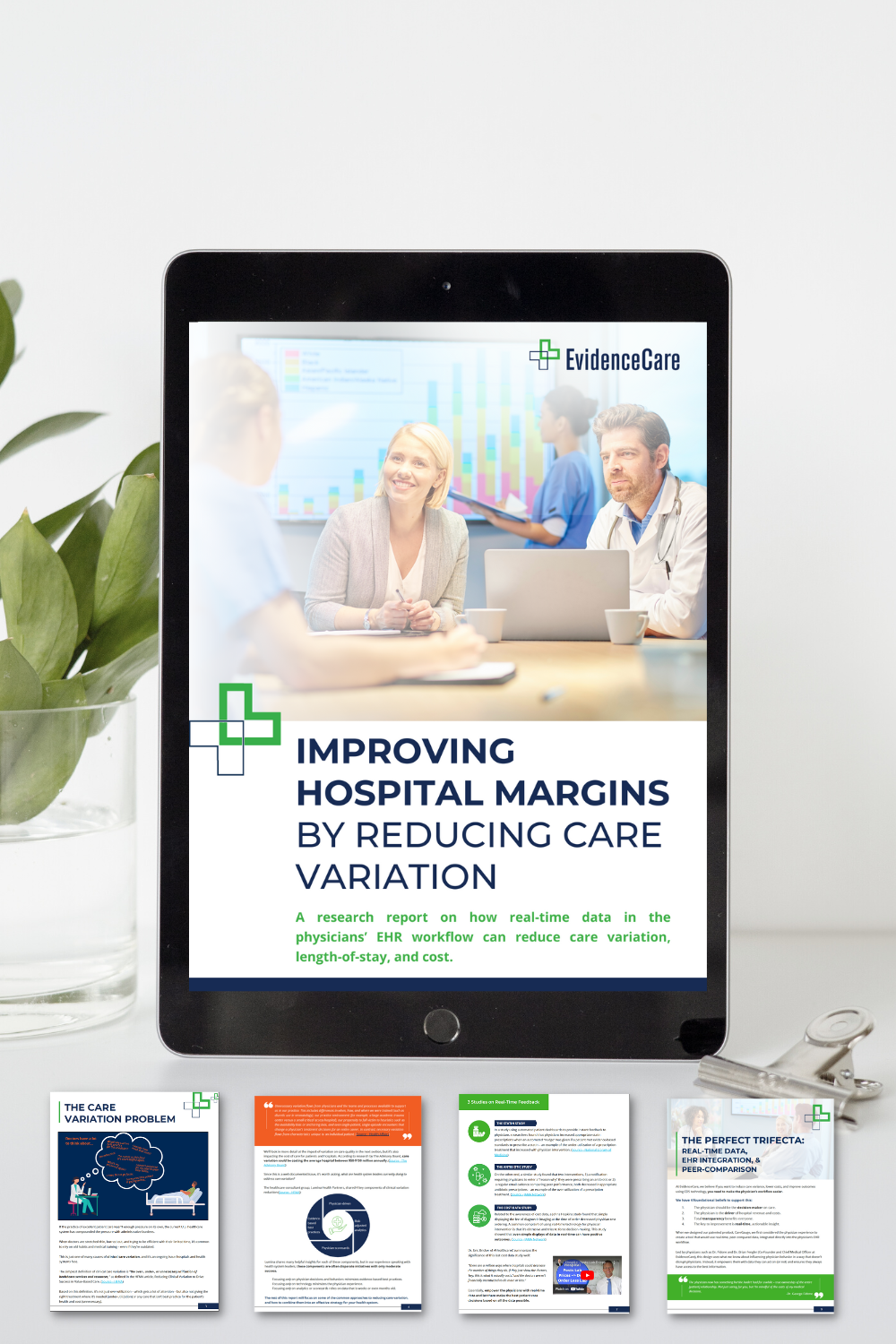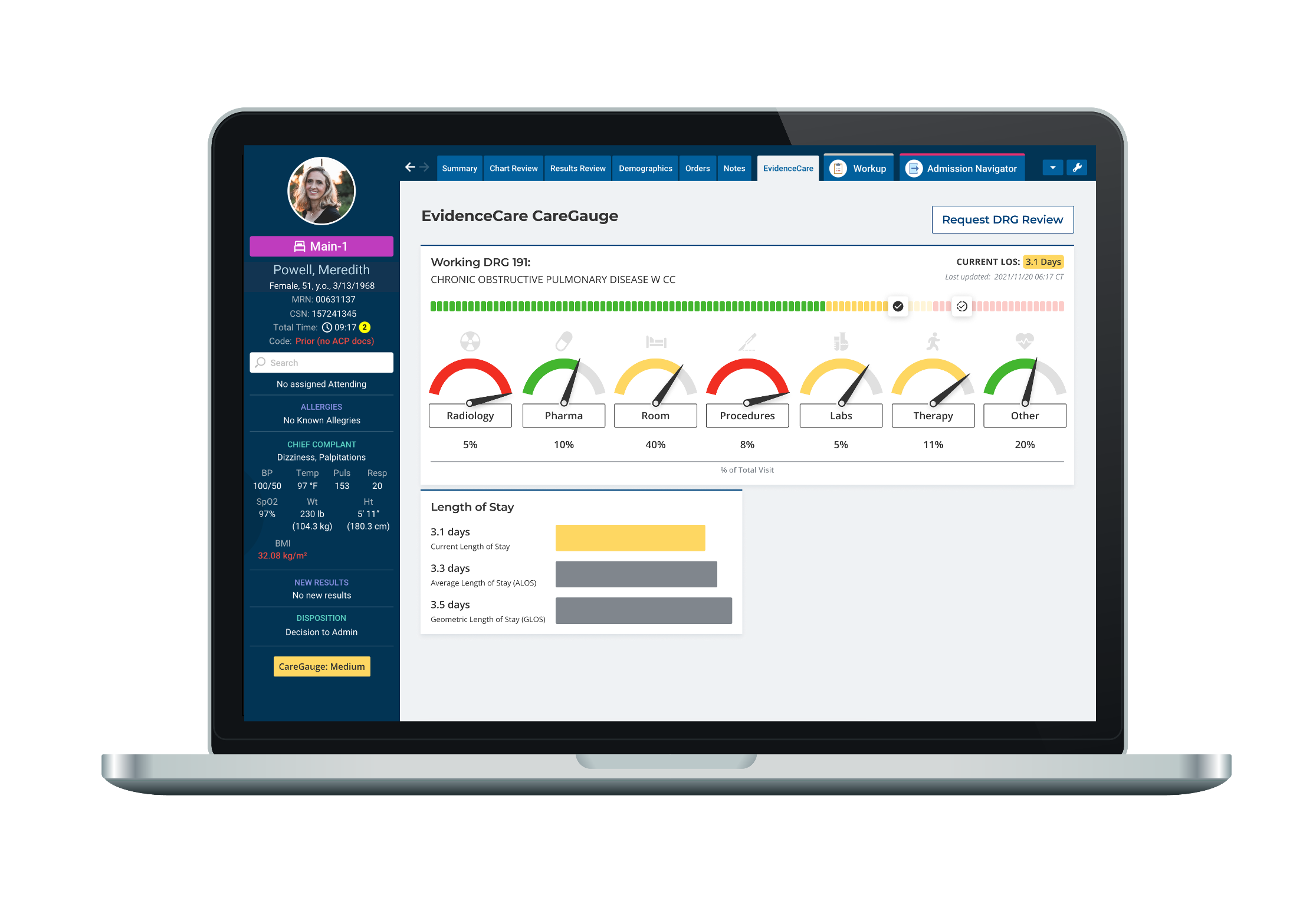Clinical Variation Software
Clinical variation is a regular occurrence in healthcare, and it’s not necessarily a bad thing. That’s because the term is often used loosely in the course of patient treatment. One clinical variation definition is “an observed phenomenon where there may be multiple different outcomes in one scenario.”
However, clinical variation is more frequently used to describe situations with adverse outcomes, such as the overuse or underuse of treatments and therapies in potentially detrimental ways to a patient’s health. Situations like this are the result of unwarranted variation. Imagine a doctor prescribing too high of a dose of a specific medication or healthcare providers pursuing a course of treatment despite a complete lack of evidence that indicates the treatment plan will be effective.
Unwarranted clinical variation is rarely the result of malice on the part of a doctor or other healthcare provider. More often than not, doctors are making decisions based on their accumulated knowledge and experience. They need tools that could help them make better, evidence-based decisions. What they really need is clinical variation software, which employs modern data analytics to manage the utilization and differences in care delivery.
Clinical decision support software can assist healthcare professionals in making informed decisions, avoiding the pitfalls of unwarranted variation. Backed by large sets of patient data, clinical variation software identifies patterns to highlight potential areas of variation among healthcare providers and the treatments they give.
The best clinical variation software packages integrate a complete clinical decision support workflow into standard treatment. This provides doctors with evidence-based guidelines and recommendations in real time. With these platforms in their medical tool belt, doctors can create personalized care plans based on the latest medical evidence, reducing unwarranted variation for optimal care.
Here is what you need to know about unwarranted variation and how clinical variation software platforms help solve the problem.
Unwarranted Clinical Variation
Unwarranted clinical variation poses significant challenges to patient safety. The end result is potentially dangerous inconsistencies that aren’t justified by a patient’s medical history. Unwarranted clinical variation is almost always due to healthcare providers diverging from evidence-based best practices without sufficient reason or using outdated evidence-based practices.
There are typically many negative outcomes from unwarranted clinical variation, with dangers to patient safety at the top of the list. Unwarranted clinical variation contributes to adverse events, inconsistent and incorrect diagnoses, sub-standard treatment, medical errors, and complications. Not only is this a dangerous path to follow, but it’s also expensive. Unwarranted variation leads to increased healthcare costs, longer treatment times, and even new issues that need new courses of treatment. Unnecessary tests and prolonged hospital stays are other negative results that drive up the cost of healthcare.
More and more doctors and hospitals are turning to software for reducing unnecessary variation in healthcare costs. Healthcare quality software and patient safety software help identify and mitigate the problems that arise out of unwarranted clinical variation. By comparing actual practices against clinical peers, these tools help identify where unwarranted variations may be creeping into treatment plans.
Because they improve patient safety and reduce costs, these software platforms are becoming a necessity in hospital quality improvement initiatives. Doctors find that they optimize resource utilization and streamline patient treatment workflows, enabling efficient and cost-effective care. You can think of clinical variation platforms as both quality improvement software and cost-saving software. It provides actionable, evidence-based insights for doctors to make better care decisions.
The integration of these software solutions into healthcare systems is one of the best proactive steps toward reducing unwarranted clinical variation. Hospital quality improvement initiatives are bolstered by implementing software for reducing unnecessary variation in healthcare costs. Health systems who have made the investment in the software are now improving patient safety and optimizing the overall quality and efficiency of healthcare services by reducing length of stay and unnecessary tests.
Reducing Clinical Variation
Reducing clinical variation is a primary goal of many doctors and healthcare organizations. But what potentially damaging practices does the software help cut down on?
Here are a few clinical variation examples that these software platforms help with:
-
- A doctor prescribing the wrong medication for a patient’s ailment or over-prescribing the correct medication without evidence for the clinical effectiveness of these decisions.
- Patients receiving rounds of treatment that are ineffective, even though there was no evidence that suggested the treatment plan would ever be effective.
- Ordering a BNP (b-Naturetic peptide) to determine improvement in heart failure, when a simple physical examination would give better information. This would make extra “pokes” for the patient and adds unnecessary additional cost.
Now consider patient treatment prescribed by doctors who use clinical variation reduction software and compare the effectiveness:
-
- Integrates with electronic health records (EHR) systems, which provides more data for analysis and diagnosis.
- Gives doctors real-time feedback about how their variation compares to others. This allows providers to make immediate changes to their decision-making process.
- Regularly updates with new data sets so doctors are working with the latest data.
When doctors are given real-time insight that their orders are not within standard practice, they’re more likely to change their behavior when warranted.
In short, clinical variation reduction software contributes to better decision-making. It provides the means for healthcare providers to prescribe based on established data. This promotes a more standardized approach to patient care. By integrating clinical variation software into electronic health record systems, healthcare organizations can ensure that clinicians have real-time access to the latest evidence and guidelines, reducing reliance on individual preferences or outdated practices.
And as clinical variation reduction software continues to advance, the further integration of such software into healthcare systems will play an increasingly vital role in achieving the goals of reduced clinical variation and improved patient outcomes.
Healthcare Variation Software
Another way to describe clinical variation software is healthcare variation software. These tools aim to tackle the differences in healthcare practices and outcomes that are not solely based on patient-specific factors.
Healthcare variation software analyzes vast amounts of patient data to detect patterns and anomalies in care delivery. By comparing the actual practices against established best practices, the software helps healthcare organizations identify areas of unwarranted healthcare variation. This information is crucial for developing targeted interventions and standardizing care protocols.
The focus on inpatient care is particularly important, as variations in hospital settings can have significant implications for patient outcomes. Healthcare variation software for inpatient care ensures that the delivery of services aligns with evidence-based guidelines, reducing the potential for complications and improving the overall quality of care.
Healthcare variation software’s key functionality includes:
-
- Real-time clinical practice monitoring.
- Data-driven insights.
- The ability to integrate seamlessly into EHR systems.
This integration ensures that healthcare providers access the latest evidence and guidelines at the point of care, facilitating informed decision-making and reducing reliance on individual preferences or outdated practices. That’s why more physicians are looking into software for identifying and reducing variation in inpatient care.
Clinical Variation Management Software
The last descriptions of this class of applications is clinical variation management software. It’s designed to address and optimize the inconsistencies in healthcare practices through systematic monitoring, measurement, reporting, and analytics. This software is integral to improving clinical decision-making and promoting a more standardized approach to patient care.
Clinical variation management software differentiates itself by measuring and analyzing clinical variation. By leveraging advanced analytics, this software scrutinizes large datasets to identify patterns and variations in care delivery. These software tools allow healthcare organizations to objectively measure the extent of clinical variation and assess its impact on patient outcomes and resource utilization.
In addition to measurement and analytics, clinical variation management software offers reporting functionalities. It generates comprehensive reports highlighting unwarranted clinical variation, facilitating transparency and informed decision-making within healthcare organizations. These reports can be instrumental in developing targeted interventions to standardize care practices and improve overall quality.
The software also plays a crucial role in enhancing clinical decision-making. By providing real-time access to evidence-based guidelines and recommendations, clinical variation management software assists healthcare providers in making informed decisions at the point of care. This feature contributes to standardizing care protocols, reducing unwarranted variations, and improving the overall quality of care.
The analytics capabilities of clinical variation management software are instrumental in identifying areas for improvement and optimizing clinical workflows. By understanding the factors contributing to variations, healthcare organizations can implement strategies to reduce unnecessary differences in care delivery, ultimately leading to more efficient and effective healthcare services. All of this adds up to healthcare providers reducing clinical variation.
If you are in the market for software for improving clinical decision making, EvidenceCare’s CareGauge offers all of the benefits of clinical variation reduction and management. It is a comprehensive solution for healthcare organizations aiming to improve clinical decision-making, measure and analyze clinical variation, and implement strategies for standardizing care practices.
Through its measurement, reporting, and analytics capabilities, CareGauge reduces unwarranted clinical variation, enhances patient outcomes, and promotes a more consistent and evidence-based approach to healthcare delivery.
As the best clinical variation software, CareGauge integrates with a doctor’s EHR workflow in a non-invasive way that doctors appreciate. CareGauge is designed to empower physicians to make the final decision, not inhibit them.
CareGauge offers zero-click, instant insight for physicians who want to avoid the pitfalls of unwarranted clinical variation. It’s EvidenceCare’s mission to empower better care decisions, and we do that by enabling physicians with the most valuable data in real time. CareGauge is the patented and award-winning result of that effort.
To find out for yourself how CareGauge reduces unwarranted variation and improves patient care, schedule a demo today.










